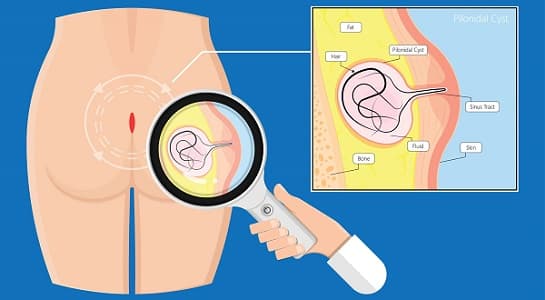An example of a pilonidal sinus is indeed a dent in your skin that appears to be a hole. It commonly occurs just above the cleft of your buttocks, which is the piece of skin behind which the tailbone bone may be found, and it can be painful. When that location becomes infected, pilonidal cysts (or cysts in general) emerge. It is a condition that affects usually adult men who spend a lot of time sitting at their jobs or post-pubescent young adult men who are going through hormonal changes that cause hair growth.
When the hair that has formed around the dent is driven into a burrow by friction, the risks of infection increase because the body perceives these bodies as foreign and reacts against them, resulting in cysts or abscesses growing surrounding the hair that has formed around the dent. The cyst and abscess might be filled with the fluid, pus, blood, or refuse, and the removal of the fluid, pus, blood, or refuse is the most important element of pilonidal sinus therapy.

At its earliest stage, pilonidal sinus could be treated with antibiotics, which are quite inexpensive. This will help to lower the likelihood of infection. A foul-smelling cyst comprising pus or filth can be cured by cleaning the affected area and then sealing the lesion after it has been cleaned. Another procedure is the injection of antiseptic into the affected area; however, this procedure is usually avoided. When a person has many sinus tracts, surgery is the most effective treatment choice.
In spite of the fact that there are numerous remedies available, the pilonidal sinus might produce cysts even after therapy. Therefore, those that have a propensity to form boils or pus should practice good hygiene and shave the affected region on a regular basis to avoid further complications.
Laser surgery for the pilonidal sinus is by far the most recent and most advanced method available, in which a laser beam is being used to remove debris or hair from the sinus and reduce the possibilities of recurrence to a bare minimum. It is among the most efficient and least invasive ways of treating pilonidal sinuses available today.
It is possible that the price of pilonidal sinus surgery will range from Rs 90,000 to INR 1,50,000, depending on the skill of the surgeon, the type of hospital used, and the type of facility used– For each treatment, a corporate hospital will typically charge some fees.
This is attributable to a variety of reasons, including: